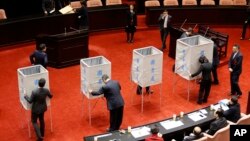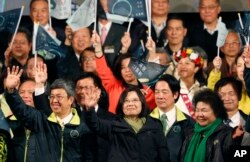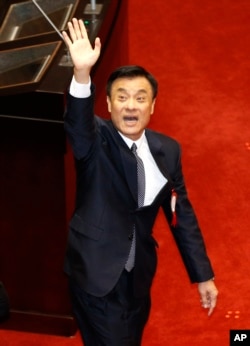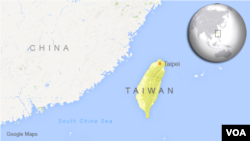Taiwan’s opposition party, historically an anti-China force, took the reins in parliament for its first time Monday with an agenda that could eventually slow dialogue with Beijing and shake up domestic politics.
The Democratic Progressive Party (DPP) was formed in the 1980s to curb the once authoritarian rule of the Nationalists.
The party won 68 of the legislature’s 113 seats last month, its first such victory. Party chairperson Tsai Ing-wen also won Taiwan’s presidential election last month, ending a Nationalist reign of eight years.
Analysts expect that over the first half of the year, parliament will work initially with the Nationalist administration’s premier, Chang San-cheng, to pass bills that both parties support. Chang, who took office after the January elections, is seen as party neutral and open to seeing consensus with legislators.
Early in the session, lawmakers might also pursue measures to boost transparency in parliament itself, for example, by publicizing the content of party caucus meetings.
Public wants reform
Tsai told her party’s legislators last week that the public wants reform.
“Reform is the expectation from the public,” she said. “I hope everyone will pay more attention to the quality and effectiveness of legislation and spend more time in the process of deliberating bills.”
After Tsai takes office in May, legislators will pursue a bill that sets guidelines on how Taiwan can negotiate with its political arch-rival China.
China claims sovereignty over self-ruled Taiwan, but the Nationalist government has set aside that issue since 2008 to work out a series of deals aimed at helping the island’s economy.
Hsu Yung-ming, a political scientist at Soochow University in Taipei, said the bill will require more input on China affairs from legislators and the public.
“One agenda item will be concerning cross-Strait relations,” Hsu said, referring to ties between Taiwan and China. “That in the future may be a point of contention. When the Democratic Progressive Party governs in the future, regarding legislative ties with parliament and public participation, they would all need to express their views.”
Lawmakers proposed an oversight bill in 2014 in response to protesters who felt Taiwan was signing deals too fast with China. But as elections loomed, the bill wasn’t ever passed.
Concerns about Beijing
Demonstrators have said they knew too little about what their government was saying to China and worried Beijing could leverage even economic agreements to exert political influence.
That public sentiment contributed to the Nationalist Party’s election losses.
Tsai says she advocates for more dialogue with China, but has not agreed with Beijing on conditions for talks. China has bristled at the change in power but is expected to keep trying for peaceful relations.
A hefty oversight bill could slow dialogue with China by requiring government negotiators in Taiwan to fulfill new requirements, such as reporting each step of a pending deal to parliament, or to the public through other channels.
Parliament may also review Taiwan’s use of nuclear energy in the current legislative session. Taiwan operates three nuclear plants, which supply 16 percent of the island’s power. The Nationalist government stopped construction on a fourth in 2014 after tens of thousands protested it.
Opposes nuclear power
The Democratic Progressive Party more resolutely opposes nuclear power. Its stance has generated particular support since 2011, when a strong earthquake caused a meltdown at a nuclear plant in Japan. Taiwan is also prone to earthquakes.
DPP lawmakers opened their session Monday by choosing a speaker, veteran lawmaker Su Chia-chuan. He was set to be sworn in on Monday afternoon followed by the quiet casting of ballots on the floor of parliament for more than an hour in the morning. Other legislators were also sworn in Monday.
Taiwan’s opposition party had made a name before this month for throwing objects or mounting physical barricades to block bills in the legislative chambers.
Political analysts expect that after Tsai takes office, the party’s legislators will push their agenda with little space for compromise.











